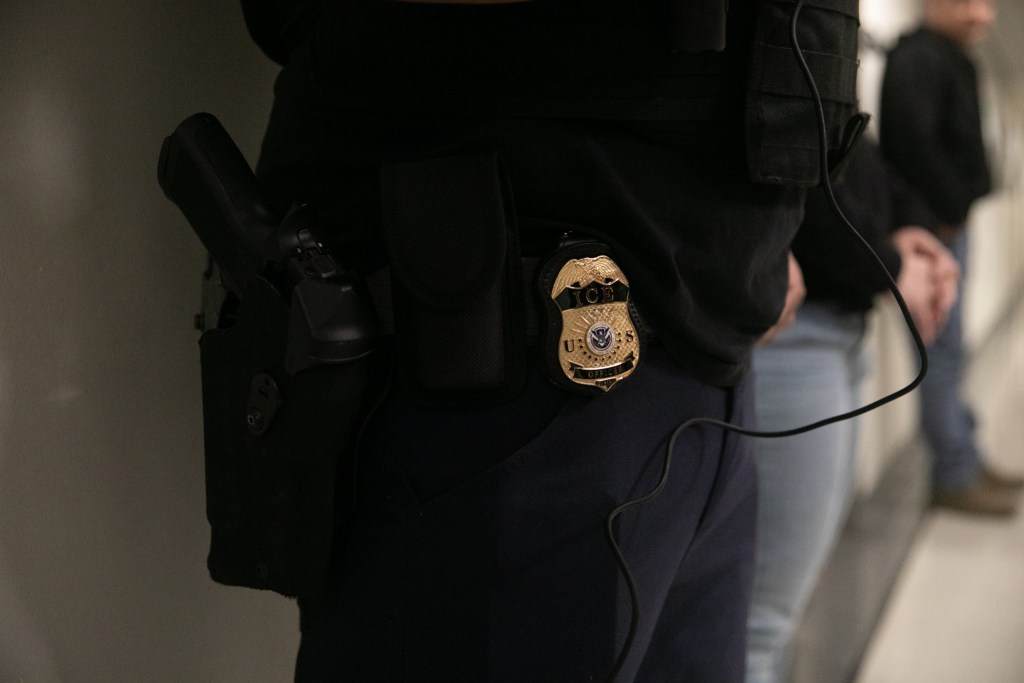A Venezuelan man from The Bronx told THE CITY that he has begun a hunger strike to protest that immigration authorities have jailed him for more than seven months, despite multiple court rulings ordering his release.
Several judges have pointedly rejected government claims that the man, whom THE CITY will identify as Jose H., due to concerns about retaliation, was a member of the Tren de Aragua gang — the basis for the Trump administration’s claim that he would pose a danger to the community.
“They are denying me my rights. I already posted two bails,” he said Wednesday in a telephone interview from the Orange County Jail in Goshen, N.Y. “They are treating me like the worst criminal in the United States, and I have never committed a crime.”
 Immigration, Customs and Border Patrol were holding detained people in the Orange County Correctional Facility. Credit: Mazin Sidahmed for Documented
Immigration, Customs and Border Patrol were holding detained people in the Orange County Correctional Facility. Credit: Mazin Sidahmed for Documented
Immigration and Customs Enforcement took Jose H., age 32, and eight other Venezuelan men into custody after raiding The Bronx rooming house where they lived — in 10 bedrooms rented out singly — on Jan. 30. Eleven agents from Homeland Security Investigations, the ICE unit that handles major crimes, were looking for an alleged Tren de Aragua member who was wanted on state weapons possession and larceny charges, but the man wasn’t there.
That’s when ICE chose to detain Jose H.
Although he has no criminal record, ICE deemed him a danger to the community, asserting without evidence that he was a member of the Tren de Aragua gang.
On March 18, New York immigration judge Dara Reid forcefully rejected this claim, calling it “entirely premised upon an unsubstantiated assertion,” and ordered Jose’s release on a $5,000 bond,
He’s been held since then, mostly under a federal regulation that was once invoked sparingly but is used increasingly in the second Trump administration. It empowers the Department of Homeland Security to block a detainee’s release automatically, simply by filing a form (EOIR-43, in bureaucratic jargon) with the court, while it appeals a bond decision. It doesn’t require DHS to offer any justification.
The Trump administration’s frequent use of the “automatic stay” to keep immigration detainees locked up has prompted a spate of habeas corpus lawsuits — the legal remedy for detention without due process– in federal courts across the country.
Since the beginning of August, federal judges issued decisions finding in at least 11 cases that ICE’s use of the regulation violated the Fifth Amendment right to due process. Six cases concerned workers arrested in a June 10 ICE raid on an Omaha, Neb., meat processing plant — Yania Garcia Jiminez, Floribertha Mayo Anicasio, Maria Reynosa Jacinto, Sabina Carmona-Lorenzo, Ernesto Cortes Fernandez and Diego Palma Perez.
Another ruled in favor of a Minnesota woman who was released and reunited with her children, aged 6 and 22 months. Antonia Aguilar Maldonado, a 25-year-old native of El Salvador, had been unable to nurse the younger one, who was breastfed because of problems taking other milk. Maldonado had continued to pump her breast milk in jail, and lamented in court papers that “It breaks my heart to know that my baby needs my breast milk, and that I just have to dump it out.”
A federal judge in Maryland likewise found on Aug. 24 that ICE had violated the Fifth Amendment rights of Fidel Leal-Hernandez, a Mexican immigrant who has been in the United States for more than 20 years.
In a Sept. 2 ruling in federal court in Las Vegas, Judge Richard F. Boulware II similarly rejected the “automatic stay” rule in favor of two men, finding that “the regulation allows an agency official who has lost in an adversarial process to unilaterally and automatically override an immigration judge’s decision with no meaningful procedural protections.”
And in Boston on Sept. 7, a judge found in favor of Elizaldo Sampiao, a Brazilian man who’d emigrated as a child and had no criminal record. He had been separated from his week-old son.
Jose H. said he started his hunger strike on Monday. When he spoke with THE CITY on Wednesday afternoon, he said he’d passed up five meals, all of which were delivered to his cell “to see if I take it.” He complained of a bad headache and a stomach ache.
Held Seven Months
Despite such rulings, Jose H. finds that after more than seven months of incarceration, he hasn’t been able to extricate himself from the procedural web federal authorities have woven around him in the immigration court.
His case illustrates the lengths the Trump administration is going to detain people who likely would have been released in the past.
And it points to the devastating impact immigration detention has on people who, like Jose H., have never been incarcerated. Court records in this and similar cases reflect a despair deepened by the seemingly arbitrary way ICE can continue jailing someone in spite of a judge’s order for release.
 Federal agents stand watch outside immigration court at 26 Federal Plaza, June 17, 2025. Credit: Ben Fractenberg/THE CITY
Federal agents stand watch outside immigration court at 26 Federal Plaza, June 17, 2025. Credit: Ben Fractenberg/THE CITY
“In the time that I have been here in prison, I’ve had thoughts of killing myself,” he concluded his interview with THE CITY, speaking in Spanish through a translator. “I’ve never had thoughts about that in my whole life.”
According to the American Psychological Association, there is a serious risk of suicide in immigration detention. “Given the existing trauma many immigrants already carry, detainees are vulnerable to developing chronic medical conditions, and the longer they spend in detention, the more likely they are to be at risk of mental health problems, including PTSD and suicide,” it said in a recent publication.
A New York City detainee from China, being held in Pennsylvania, died by hanging last month, The Intercept reported.
Requests for comment THE CITY sent Wednesday to the ICE media offices in New York and Washington, to the agency’s chief counsel in New York and to the DHS media staff in Washington were not returned.
Jose’s Ordeal
For Jose H., the trauma has included an excruciatingly long journey to an immigration lockup in Texas — where he was plagued with fear that he would be transported to El Salvador — and back again to the jail in Goshen.
He has struggled since and is unable to support his 10-year-old daughter in Venezuela, and he thinks about giving up, his lawsuit says. He has received mental health counseling in Orange County, but “The only thing they do is ask stupid questions, things you already know.”
Since ICE acknowledges that he has no known criminal record, Jose H.’s incarceration continues to rest on the rejected allegation that he is a member of the Tren de Aragua gang — the basis for the government’s claim that his release would pose a danger to the community.
Jose H.’s ”credible” testimony on March 18, along with the weakness of the government’s evidence, convinced Judge Reid to release him. Since the burden was on Jose H. to prove he was not a danger, the judge’s decision meant she found that his testimony was more convincing than ICE’s claims.
In her ruling, the judge noted that ICE insisted its accusation of a gang connection should be accepted because it was submitted to the court in a form, called an I-213, that is supposed to be presumed reliable. The judge rejected that argument.
DHS then invoked the automatic stay of Jose H.’s release and appealed the decision to the Board of Immigration Appeals.
ICE’s attorney tried another way of getting around the lack of evidence connecting Jose H. to Tren de Aragua, which the Trump administration designated on Feb. 20 as a foreign terrorist organization. She argued that since Jose H. was a terrorist, in the government’s view, he should have been held in mandatory detention.
The board rejected that and upheld Reid’s original ruling, with the exception that it returned the case to her “to determine a higher amount of bond.”
She set a new bond of $9,500 on May 30 — but the government invoked the automatic stay on the same day. ICE based its second appeal to the Board of Immigration Appeals on a complaint that the judge didn’t re-open the case to accept new evidence it offered at a June 26 hearing.
That evidence, according to court papers, consisted of photos of tattoos on Jose H. showing a tiger, a nautical compass and a rose, and social media posts in which he and his partner had used emojis depicting trains and ninjas — all alleged to be signs of gang membership. There was also a claim, unexplained, that there was Tren de Aragua “affiliated paraphernalia” in the rooming house where Jose H. lived.
In the interview, Jose H. scoffed at it. “It’s stupid that they are accusing me because of some emojis on Tik Tok and some tattoos.”
The judge didn’t buy the ICE argument either, as THE CITY previously reported. She told the government lawyer that she was “sick of the shenanigans,” and delayed the case while Jose H.’s attorney tried going to federal district court to win relief on constitutional grounds through a habeas corpus petition. She told Jose H.: “I really do believe your due process rights are being violated.”
Both cases are pending. The Board of Immigration Appeals has allowed ICE to continue to delay Jose H.’s release while it considers the matter further.. Eight weeks after both sides submitted their arguments, the board has yet to rule.
Pinned Down and Cuffed
Meanwhile, U.S. District Judge Andrew Carter declined to grant a preliminary injunction to free Jose H. I
The judge hasn’t issued an opinion explaining why, but the reason appears to involve his questions about how many days Jose H. was held under “automatic stay” and how many under the “discretionary stay.”
To Jose H., it’s all the same: “The judge says I haven’t been in prison enough time.”
His cell is also searched more frequently, apparently to see if food is hidden. After 72 hours — nine meals missed — ICE protocol calls for him to be examined in a hospital.
Correction officers — a lieutenant and two sergeants — visited him to ask why he was on a hunger strike. It wasn’t a protest against the jail, he said, but rather against ICE for continuing to hold him. “The ICE officer called me and he said to me that if I think [by] going on a hunger strike they’re going to get me out, I was wrong,” he said, adding that he was told, “I had no right to be in the United States.”
His lawyer from the nonprofit Brooklyn Defenders, Ilana Herr, who was present when THE CITY interviewed her client, differed: He had been paroled into the United States in 2022, had applied for asylum in 2023 on the basis of his political opposition to Venezuelan President Nicolas Maduro, and was granted a work permit. He worked for a food delivery service.
At the jail, developments continued to unfold. Correction officers took Jose H. to a medical unit for tests after he refused dinner on Wednesday night. According to his lawyer, he told her Thursday that an officer pushed him to the ground when he refused to go to a medical observation cell and that three officers pinned him down to handcuff him, hurting his knee and jaw in the process. He was sent to a cell with only a mattress on the floor, she said.
In addition, Herr said, he told her that ICE officers threatened to send him to a jail in Louisiana or Florida if he continued the hunger strike. To avoid transfer or the isolation of the medical observation cell, he agreed to a doctor’s offer to eat a piece of bread in return for a promise that he will be returned to his usual cell, Herr said, adding that her client said he had no appetite for it.
Samantha Pascal, a spokeswoman for Orange County Sheriff Paul Arteta, declined to comment. She said it would be necessary to file a Freedom of Information Law request.
Current data isn’t available on how often ICE is invoking the “automatic stay,” which is based on a regulation published the month after the Sept. 11, 2001, terrorist attack. Federal courts have been mostly skeptical of it ever since, with many rulings finding that the rule went beyond what federal immigration law permitted.
Jose H. still has roads to his release. His habeas case in federal court is continuing, and so is his immigration case. He has a video hearing scheduled for Monday before an immigration judge in the Varick Street court on his quest for asylum — “if I make it there, because the way I’m feeling, I don’t know.”
Related
